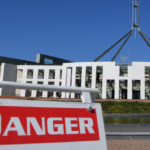Climate change conference: teamwork or tug-of-war?
We live in a globalised world, and therefore climate change is also a social justice issue. Australian social worker Megan Bonetti, volunteering in India, reports from a developing country having to figure out how to go green on the cheap.
India. Culture, cows and rubbish. As an Aussie living for a short time in India it is such an intriguing country. Indians love their diverse nation yet they use the streets like rubbish dumps. Even my friends here tell me it’s ok to throw my paddle-pop wrapper out the car window. I can’t… so I just hold it tight and wait till I get home. Growing up in Australia, those ‘emu hunts’ in primary school have willed my littering days away. Yet I suspect that even my household trash bin will just be dumped across the road for the cows to eat or worse still, burnt on the street… for the cows to eat. This is India. Love it or hate it. (#tii)
As an Australian social worker volunteering with an NGO in Southern India I witness the large divide between the rich and poor of this incredibly colourful nation. I work with many children whose whole families have had to migrate from various parts of India due to the rapid effects of drought on their land and the significant urbanisation of major cities in the last 10 years. It turns out India has seen a boom in its industrial and technological trades a little later than its western neighbours and they are loving it.
But India’s urban boom is threatened with westerners telling them they have to stop producing and polluting. The earth doesn’t like it. Sorry India… We made our big capitalist bucks, but you don’t get that chance. Just when things are getting good and you’re developing astronomically, your main source of energy is being taken away.
It turns out fossil fuels are the cheapest form of energy for the developing world, especially as they try in earnest to develop the same standard of living as we have. So as one the most formidable countries in the developing world, India not only has the pressures of navigating a massive population but also has to figure out how to go green on the cheap.
It’s interesting that the Turnbull government has reluctantly agreed on a 5% reduction in carbon emissions in the next five years. “Phew! Glad we got through that one, boys.” They wipe their sweaty brows while developing countries are drowning, burning and trying to survive on scant resources. These countries are just trying to make a crust, while Eurocentric nations are slowly turning a baguette into organic multigrain sourdough (and throwing the crusts to their hobby cows).
If the 2015 United Nations Climate Change Conference in Paris is truly the last attempt for international cooperation, leaders cannot just show and tell their contribution and sit back with folded arms. But how can mere human individuals promote serious teamwork?
This brings me back to the children I work with here in India. Every day their parents’ lives are tied to corrupt building associations. They are bonded labourers—gypsies moving from construction to construction. These families have no hope of returning to their now desolate homeland and are not provided social security measures that protect their livelihood. Then there is India’s neighbour, low-lying Bangladesh, experiencing saltwater intrusion that poisons whole water supplies for entire villages. In our own backyard we see Australian farmers shooting all their cattle only to turn the gun on themselves under the shadow of unprecedented drought. This is human impact.
Global warming is not just about penguins and polar bears. Climate change is a social justice issue. We live in a globalised world. The industrial revolution brought us here, and climate change is the consequence. No longer do we just neighbour cities, we neighbour nations. The leaders of Australia must be held accountable to all their neighbours, including the ones just trying to keep their head above water. It simply won’t do for wealthy nations such as Australia to show the world their own country’s carbon reductions and sit back down. This summit can’t work as a set menu; it has to be a potluck dinner, a time for sharing, understanding and safeguarding.
For the sake of our beautiful earth and the many diverse cultures of the human race, this time I hope and pray that the leaders of the world provide a resounding voice for the marginalised. This summit and our government must not stop at figures, but uphold the basic democratic and human rights principles that cradle modern society. The United Nations was created so that man-made and worldwide calamities could no longer grasp our world with such authority. Well, it turns out a world war with Mother Nature is knocking on our doorstep. Will we listen and respond? I hope so.
For more information please visit the below links. They offer great insights into climate change realities and are positive and accessible resources for engaging the conversation:
- The reality of climate change. David Puttnam, TEDxDublin
- India: Climate Change Impacts. The World Bank
- Climate Change and the End of Australia. Rolling Stone
- The Critical Decade: Climate Change and Health (Australia). The Climate Commission
- GoPro: Climate Change and the Optimistic Future. Professor Richard Muller of Berkeley Earth Foundation
- Paris Climate Conference: COP21 Explained. CNN’s Columnist John Sutter
- Why is the Paris UN climate summit important? Leo Johnson, PWC UK
- Adam Bandt asks new PM Malcolm Turnbull on climate change in Question Time on 14 September 2015
- Morgan Freeman’s powerful climate change short film
Megan Bonetti wishes to play her part in creating a loud voice for the marginalised. She is a huge fan of advocacy on a large scale and has recently begun writing about topics that she is passionate, challenged or excited about. In doing this she hopes to create a broader voice for many overlooked.












Max Thomas
November 6, 2015 at 11:54 pm
Tugs of War
Another interesting read Megan. The Vietnam war, with the 'cold' war looming in the background, and all the accompanying civil unrest were the major pre-occupations of my youth. Not forgetting that, even then, the 'greenhouse effect' was just entering the conversation. But I doubt I ever possessed the courage to live out my convictions as you are doing. With all the respect that is your due, I sense you have your doubts as to the ability, or will, among world leaders to solve the problems you have outlined. Expecting them to do so on behalf of those who enjoy the benefits of the status-quo, is perhaps too optimistic. John Passmore, in his Boyer lectures of 1981, "The Limits of Government", convincingly explained why over-reliance on government inevitably leads to disappointment, and subsequent events have tended to vindicate his position. However, your example of "Direct Action" at the social roots of our problems seems more likely to produce lasting change than the Australian government's policy of the same name. In addition to the concepts explained by Passmore, I think it is important for people to grasp the awful dilemma known as "The Tragedy of the Commons". This is the dilemma of many individuals acting rationally and separately in their own self-interest, knowing that a shared and limited resource, such as the atmosphere, will ultimately be depleted or altered against the best interests of all. I mention this because your example of thinking beyond immediate self-interest seems the only way forward. Waging war against nature, as you know, has already proven to be a futile, lost cause. I wish you success in your work and a safe return home.